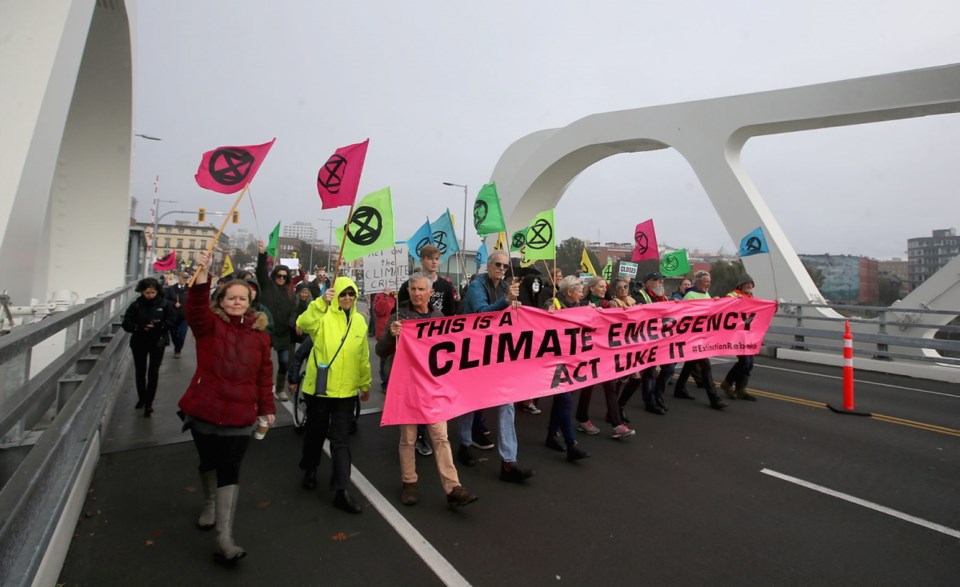The decision by a small group of protesters to close the Johnson Street Bridge during the afternoon rush hour on Monday was an assault on our civic way of life. An organization calling itself Extinction Rebellion Vancouver Island said it hoped the protest would start conversations about climate change.
It certainly will start conversations, though not of the nature this group wants. Johnson Street Bridge, apart from being part of a public highway, is a vital link between Esquimalt, Victoria West and the downtown area.
In blocking this link, the protesters seriously inconvenienced thousands of people who were simply going about their everyday chores: seeing a physician, taking the kids to a dentist, buying food for dinner.
Similar protests blocked bridges in Vancouver, Calgary, Edmonton, Halifax, Kitchener and Toronto, leading to several arrests.
By what right do these groups claim to impose such turmoil? Certainly there is an entitlement to protest. But there is no right to block traffic on a major thoroughfare.
More than that, how does forcing hours of idling traffic help the environment? If the objective were to accelerate global warming, a better means would be hard to find.
We had another such act of disorderly conduct a few months ago, when marchers protesting pipeline construction occupied both northbound lanes of the Pat Bay Highway for several kilometres, before heading off to Island View Beach.
On that occasion, traffic was held up for more than an hour, no doubt causing tourists unfamiliar with backroads to miss ferries or flights.
We call both protests disorderly, because there is an established process for gaining a permit to hold such an event. But no permits were requested and none were issued. The protesters simply took matters into their own hands.
The role of local police forces comes into question here. In neither of those instances did law-enforcement agencies intervene.
In the case of the pipeline protest, law-enforcement officers met with leaders of the group. Reportedly, they determined that a number of “troublemakers” were present, hoping for a confrontation.
Preferring not to let this happen, officers stood aside and did not intercede when the group occupied both northbound lanes.
This was a clear failure to keep the peace. It would have been entirely possible to confine the marchers to the one lane, leaving the other lane for vehicles to slowly pass.
Much the same thing happened during the blockage of the Johnson Street Bridge. Police were present, but other than escorting buses and emergency vehicles, did nothing.
On each occasion, in our opinion, law-enforcement staff failed to protect the right of free passage on a public highway. This is a precedent that will be repeated until someone in authority takes a stance.
What is particularly frustrating is that a perfectly good alternative existed in both these cases.
If you have a political issue to raise, take it to a political venue. The obvious option would be the front lawn of the legislature.
There, you can protest to your heart’s content, while ordinary folks go about their business unhindered.
For the complaint is not with blameless passers-by. It is with governments and politicians.
The reply may be made that it is only by infuriating the public that attention can be drawn to whatever cause someone wants addressed.
But this isn’t legitimate protest. It is mere hostage-taking.
The hope, apparently, is that if enough misery is visited on the local population, politicians will take note. A more realistic outcome is that people who might initially be sympathetic with the cause at hand will withdraw that sympathy when they see themselves being used as pawns.
Both of these protests badly damaged the image of the groups who organized them and the cause they espouse. By riding roughshod over local sentiment and local needs, they showed themselves at once arrogant and overly filled with righteousness.
Ironically, neither protest was needed. Polling shows that residents of the capital region overwhelmingly support action to reduce global warming. So why poke them in the eye?



